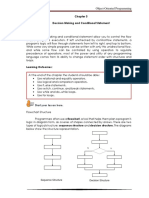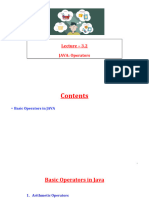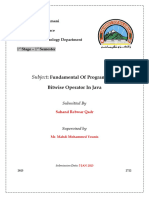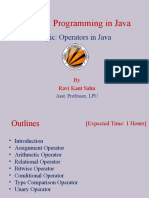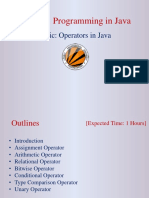05/04/2024, 12:53 Short Circuit Logical and Boolean Operators in Java by Example
cs-fundamentals.com
programming tutorials and interview questions
Home
C Programming
Java Programming
Data Structures
Web Development
Tech Interview
Java Logical and Boolean Operators: Short-circuit and
Not-short-circuit
Java Logical and Boolean
Operators Table
Java Logical Operators
(Short-circuit)
Logical AND (&&)
Logical OR (||)
Java Boolean Operators
(Not-short-circuit)
Boolean AND (&)
Boolean OR (|)
Boolean XOR (^)
Boolean NOT (!)
References
Java Logical and Boolean Operators Table
When two or more relational expressions are involved in a decision making
statement, they are combined by logical operators. Logical operators come in two
flavors - short circuit and not-short circuit. They both operate upon boolean values
and they evaluate to boolean values. Short-circuit operators are called logical
operators while not-short-circuit operators are called boolean operators.
Both short-circuit and not-short circuit operators perform logical operations on
boolean expressions, but there is a difference between their operating styles - short
circuit logical operators evaluate second expression only if this is needed. For
example, if you want to perform a logical AND between expr-1 and expr-2 and if
expr-1 yields false then no matter what expr-2 returns; the final result will be
false . In that case expr-2 ; if left un-executed, will have no impact on final outcome
of the AND operation. It makes the operation faster. On the contrary not-short
circuit logical operation executes all boolean expressions given for execution.
For example, if A and B are two boolean expressions then following Java logical
operators can be applied on expressions A and B.
Table 5: Demonstration: Java logical operators
https://cs-fundamentals.com/java-programming/java-logical-operators 1/5
05/04/2024, 12:53 Short Circuit Logical and Boolean Operators in Java by Example
Operation Description Type
A && B logical AND short circuit
A || B logical OR short circuit
A&B boolean logical AND not short circuit
A|B boolean logical OR not short circuit
A^B boolean logical exclusive OR
!A logical NOT
Short circuit logical operators are efficient and safe to use, that's why we usually do
not see not-short circuit in programs.
Java Logical Operators (Short-circuit)
&& and || are Java's logical operators, these operators
are also called conditional operators. They perform a
boolean operation on their two boolean operands and
evaluate to a boolean result.
Logical AND (&&)
Logical AND performs a Boolean AND operation on its operands. It evaluates to
true if and only if both operands of logical AND are true. If either or both operands
are false , it evaluates to false. For example:
// Evaluates to true, if both comparisons are true
if (x < 10 && y > 3) ...
Note that all logical and boolean operators except the unary ! operator have a
lower precedence than the comparison operators. Thus, it is perfectly legal to write
a line of code like the one above. However, some programmers prefer to use
parentheses to make the order of evaluation explicit:
if ((x < 10) && (y > 3)) ...
Logical AND or conditional AND operator is called short-circuit operator because it
conditionally evaluates its second operand. If the first operand evaluates to false, the
value of the expression is false, regardless of the value of the second operand.
Therefore, to increase efficiency, the Java interpreter takes a short-cut and skips the
second operand. Since the second operand is not guaranteed to be evaluated, you
must use caution when using this operator with expressions that have side effects.
On the other hand, the conditional nature of this operator allows us to write Java
expressions such as the following:
if (data != null && i < data.length && data[i] != -1) ...
Logical OR (||)
https://cs-fundamentals.com/java-programming/java-logical-operators 2/5
05/04/2024, 12:53 Short Circuit Logical and Boolean Operators in Java by Example
Logical OR operator performs a boolean OR operation
on its two boolean operands. It evaluates to true if
either or both of its operands are true . If both
operands are false , it evaluates to false . Like the &&
operator, || does not always evaluate its second
operand. If the first operand evaluates to true , the value of the expression is true ,
regardless of the value of the second operand. Thus, the operator simply skips that
second operand in that case.
Java Boolean Operators (Not-short-circuit)
Boolean AND (&)
When used with boolean operands, the & operator behaves like the && operator,
except that it always evaluates both operands, regardless of the value of the first
operand. This operator is almost always used as a bitwise operator with integer
operands, however, and many Java programmers would not even recognize its use
with boolean operands as legal Java code.
Boolean OR (|)
This operator performs a boolean OR operation on its two boolean operands. It is
like the || operator, except that it always evaluates both operands, even if the first
one is true. The | operator is almost always used as a bitwise operator on integer
operands; its use with boolean operands is very rare.
Boolean XOR (^)
When used with boolean operands, this operator computes the Exclusive OR (XOR)
of its operands. It evaluates to true if exactly one of the two operands is true. In other
words, it evaluates to false if both operands are false or if both operands are true .
Unlike the && and || operators, this one must always evaluate both operands. The ^
operator is much more commonly used as a bitwise operator on integer operands.
With boolean operands, this operator is equivalent to the != operator
Boolean NOT (!)
Boolean ! is a unary operator that changes the boolean value of its operand. If
applied to a true value, it evaluates to false , and if applied to a false value, it
evaluates to true . For ! is a unary operator, it has a high precedence and often must
be used with parentheses. It is useful in expressions like these:
if (!found) ... // found is a boolean variable declared somewhere
while (!c.isEmpty()) ... // isEmpty() returns a boolean value
if (!(x > y && y > z))
Last Word
https://cs-fundamentals.com/java-programming/java-logical-operators 3/5
05/04/2024, 12:53 Short Circuit Logical and Boolean Operators in Java by Example
In this tutorial we discussed boolean and logical operators of Java. Hope you have
enjoyed reading this tutorial on logical operators. Please do write us if you have any
suggestion/comment or come across any error on this page. Thanks for reading!
References
1. Core Java Volume I - Fundamentals
2. Java: The Complete Reference, Seventh Edition
3. Operators: Sun tutorial
4. Bit Twiddling Hacks
All Topics
Home
C Programming Tutorials
Java Programming Tutorials
Data Structures Tutorials
All Tech Interview Questions
C Interview Question Answers
Java Interview Question Answers
DSA Interview Question Answers
Get Free Tutorials by Email
Email:
Subscribe
https://cs-fundamentals.com/java-programming/java-logical-operators 4/5
05/04/2024, 12:53 Short Circuit Logical and Boolean Operators in Java by Example
About the Author
Krishan Kumar is the
founder and main
contributor for cs-
fundamentals.com. He is a
software professional (post graduated
from BITS-Pilani) and loves writing
technical articles on programming and
data structures.
Home Contact Us About Us Write For Us RSS Feed
© copyright 2016 cs-fundamentals.com
https://cs-fundamentals.com/java-programming/java-logical-operators 5/5










